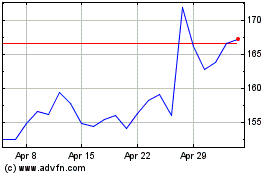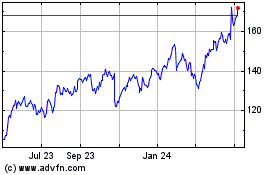By Sam Schechner and Jenny Strasburg
The continent that helped lead a backlash against Silicon
Valley's appetite for personal data is increasingly aligning itself
with technology built by Apple Inc. and Alphabet Inc.'s Google to
blaze a path out of the coronavirus pandemic.
Countries across Europe, like others in the developed world, are
building their own smartphone apps to help conduct contact tracing.
The aim of the apps is to help public-health officials identify and
test everyone who has spent time near an infected person, to better
understand and contain the virus.
European countries including Germany, Italy and the Netherlands
have opted for or are considering technical standards for these
apps that are developed by Apple and Google. In some cases, they
have switched to the Silicon Valley model after first trying
homegrown options.
The embrace of Apple and Google protocols by European countries
contrasts with the approach in the U.S., where state and local
authorities are taking the lead on digital contact-tracing efforts.
In the U.S., the debate over what type of apps to build has focused
in part on whether to collect and compare users' locations using
satellite-based tools embedded in most smartphones -- something
Apple and Google aren't allowing with their exposure-notification
system.
The movement toward Apple and Google in Europe is being driven
in part by the same officials who previously have gone after U.S.
tech giants over privacy concerns and other issues. European
privacy regulators say they have a preference for systems like the
one being developed by Apple and Google because they use a
decentralized approach to data gathering -- collecting little of it
centrally and keeping most of it on users' phones.
Margrethe Vestager, the European Commission's competition czar,
has long tangled with Apple and Google on anticompetitive concerns.
She is now backing the type of technology the pair is using for
contact tracing, in part to promote an interoperable framework
across the continent.
"It's important to have a common European approach, and right
now the tendency is toward a decentralized system," Ms. Vestager
told the European Union's parliament last week, adding that she
hopes such apps will "enable at least some traveling during the
summer period."
A rival approach for building contact-tracing apps involves
collecting and storing data at centralized depositories, which
governments or health-care systems can hold onto and use. France,
Norway and the U.K. have said they want public-health authorities
to control and learn from the data generated from tracing the
contacts of tens, if not hundreds, of thousands of infected
citizens over the coming months.
The U.K. has said epidemiologists need this information to see
transmission patterns and guide public policy. French officials say
it is safer for the state to control the information of infected
people. Both say anonymization and other built-in safeguards limit
human access to personal data, protecting privacy.
Britain's state-run National Health Service is testing its own
custom app based on a centralized approach. But it is also working
on a backup plan -- an Apple/Google-standardized model that could
replace the first app if it doesn't work as well as expected,
people familiar with the work say.
U.K. and French officials have been frustrated by limitations to
some crucial app functions imposed by Apple and Google, which they
worry could hurt the government's ability to collect useful data,
according to people familiar with the matter.
Apple and Google declined to comment on any specific country's
efforts or apps. The companies say they developed their system to
help public-heath authorities around the world and have adapted it
based on their feedback. Privacy is a core of the system because it
will help build user trust and adoption, the companies say.
The strategy of using phone data to help track potentially
infected people has been used, with varying degrees of success,
since the beginning of the outbreak earlier this year. Some
countries in Asia have tapped into cellular-network data for
location information to track who was near infected people.
Singapore built a voluntary app, TraceTogether, to track contacts,
but it wasn't widely adopted and hasn't so far had a significant
impact.
Like TraceTogether, apps popping up across Europe mostly use
Bluetooth -- a technology commonly used to link wireless speakers
and keyboards -- to determine who was close to whom, rather than
location-based tools. A group representing EU privacy regulators
said tapping into phones' location data for contact tracing would
reveal too much sensitive information about users.
Phones running Bluetooth contact-tracing systems, like the one
designed by Apple and Google, emit a unique ID number that changes
frequently. They also record the ID numbers of any phone in
proximity for more than, say, five or 10 minutes.
Most of the apps in use or in development in Europe rely on
users voluntarily reporting when they are confirmed to be infected.
In the decentralized model employed by Apple and Google, an
infected person's phone uploads information about all of the ID
numbers it has broadcast over a set time period, typically the last
14 days, to a temporary server. Other phones check that server to
see if any of the IDs are among those they have recorded. If one
matches, then the app notifies the user.
In the centralized model, the infected person's phone uploads a
list of the ID numbers it has encountered in the set time period. A
central server then determines any encounters with infected users.
It notifies those exposed but also retains the data involved.
Proponents of the centralized model say it gives a government or
health system more information about how the virus travels and who
could be affected. Detractors say that gives the government too
much information about the social interactions of too many people
and would be incompatible with decentralized apps.
In recent weeks, Germany, Italy and Ireland have switched to the
Apple-Google system or a compatible decentralized model, joining
Austria and Switzerland. Italy, the first European country badly
hit by the virus, planned a homegrown model. It switched to the
Apple/Google standard "because it's simpler to adopt," said a
person familiar with the matter.
Belgium and the Netherlands are also moving toward that model.
The Netherlands is considering building an app using the
Apple-Google framework, a health ministry spokesman said. In
Belgium, the government and major parties are supporting a bill,
set to be voted on later this month, to require any contact-tracing
apps to use Bluetooth and be decentralized.
Write to Sam Schechner at sam.schechner@wsj.com and Jenny
Strasburg at jenny.strasburg@wsj.com
(END) Dow Jones Newswires
May 17, 2020 08:14 ET (12:14 GMT)
Copyright (c) 2020 Dow Jones & Company, Inc.
Alphabet (NASDAQ:GOOGL)
Historical Stock Chart
From Mar 2024 to Apr 2024

Alphabet (NASDAQ:GOOGL)
Historical Stock Chart
From Apr 2023 to Apr 2024
